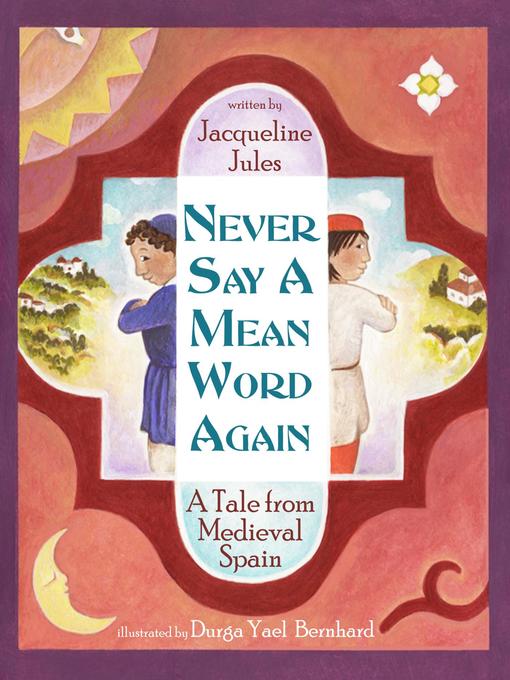
Never Say a Mean Word Again
A Tale from Medieval Spain
فرمت کتاب
ebook
تاریخ انتشار
2014
Lexile Score
480
Reading Level
1-2
نویسنده
Durga Yael Bernhardناشر
World Wisdomشابک
9781937786311
کتاب های مرتبط
- اطلاعات
- نقد و بررسی
- دیدگاه کاربران
نقد و بررسی

Starred review from April 21, 2014
Inspired by a legend about a Jewish vizier who advised the Muslim ruler of medieval Spain, this story tells of a conundrum faced by a boy named Samuel and the counterintuitive wisdom of his father, the vizier. After Samuel accidentally offends Hamza, the tax collector’s son, and incurs endures his rage (“Donkey Brain! Stupid! Look what you did!”), Samuel’s father instructs him, “Make sure Hamza never says a mean word to you again.” With illuminating details—such as the boys’ headwear, backdrops of thick stone walls or heavy wooden doors, geometric patterns in mauves and browns, and a vine and flower motif—Bernhard’s (Around the World in One Shabbat) illustrations convey an elegant, multicultural castle environment. Energy and movement infuse the paintings, which humorously render Samuel’s contemplated strategies (“Maybe he could train a monkey to sit on Hamza’s shoulders. The monkey could clamp Hamza’s lips shut”). Jules’s (the Zapato Power series) down-to-earth narrative communicates Samuel’s subtle internal transformation as the unexpected, amusing, and touching outcomes of his attempts to obey his father turn a power struggle into a budding friendship. Ages 4–8. Illustrator’s agency: Herman Agency.

May 1, 2014
K-Gr 2-Samuel accidently bumps into Hamza and further angers the boy when his goblet of wine tips over onto him. Samuel's father instructs him to "make sure Hamza never says a mean word to you again." Without meaning to, Samuel finds himself playing with Hamza day after day-a game of catch, a game of chess, a game of marbles-until they have become friends. At length, Samuel realizes that he has unwittingly achieved the goal his father set for him. None of this hangs together very well in Jules's episodic, purpose-driven telling, which, according to her author's note, was inspired by a medieval legend. The lesson that extending the hand of friendship is preferable to escalating tensions is certainly worth teaching, but it's not very tastily presented here. Bernhard's paintings incorporate decorative and architectural elements, lending a sense of the story's setting.-Miriam Lang Budin, Chappaqua Library, NY
Copyright 2014 School Library Journal, LLC Used with permission.

























دیدگاه کاربران